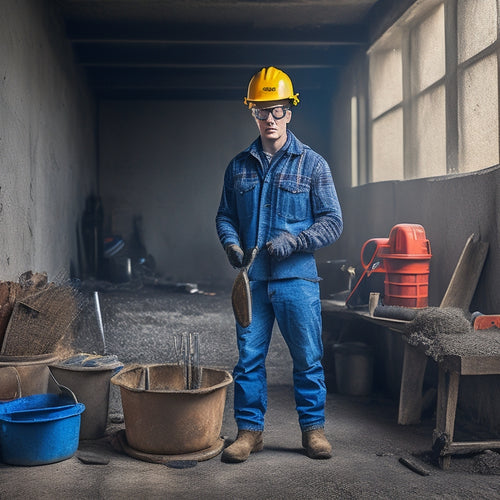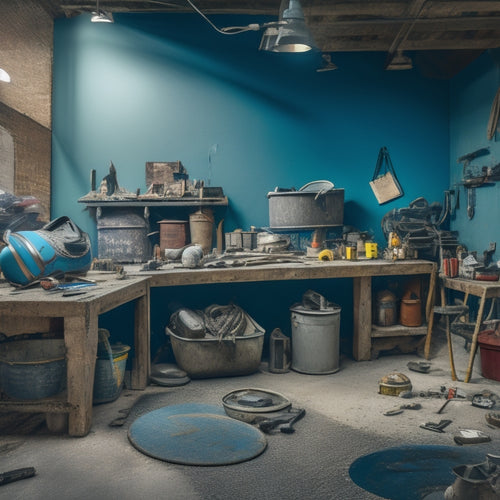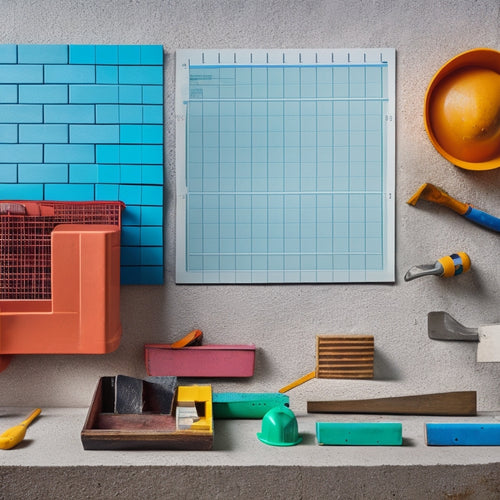
5 Budget-Friendly Tools for Concrete Paving Success
Share
You can achieve concrete paving success on a budget by incorporating essential tools into your workflow. Start with an edger's trowel, edging chisel, and jointer/edging scraper for shaping and smoothing edges. Next, consider manual or powered tamping and compacting tools, depending on your project's size and scope. A concrete saw, masonry blade, and hand edger will help you make precise cuts and refine edges. Don't forget budget-friendly laying accessories like mixers, adjustable speed controls, and cost-effective molds. Finally, finishing touches like edging trowels, sealants, and joint sand will give your project a professional finish, and you'll be surprised at how far your budget can stretch with the right tools.
Key Takeaways
• Invest in an edger's trowel for shaping and smoothing concrete edges for a polished finish.
• Utilize manual tools like hand tampers and compactors for cost-effective small projects.
• A concrete saw is a must-have for making straight cuts, while a masonry blade is perfect for curved cuts.
• Budget mixers prepare quality concrete blends without overspending, ensuring consistent results.
• Edging trowels create clean, defined edges, and eco-friendly sealants protect concrete pavers from the elements.
Essential Edging Tools for Beginners
You'll need to invest in a few essential edging tools to achieve a professional-looking finish on your concrete paving project.
As a beginner, it's vital to master the basics of edging techniques to create clean lines, smooth changes, and a polished appearance. Start with an edger's trowel, used to shape and smooth the concrete along the edges. Next, invest in an edging chisel, which helps to remove excess concrete and create a defined edge. A jointer or edging scraper is also necessary for cleaning and preparing the edges for finishing.
Proper tool maintenance is important to extend the life of your edging tools and guarantee peak performance. Regularly clean and inspect your tools for damage or wear. Store them in a dry place, and apply a rust-inhibiting coating to prevent corrosion.
Affordable Tamping and Compacting
With a well-edged concrete surface in place, it's time to focus on compacting and tamping to secure a stable and even base, and the good news is that you can achieve this without breaking the bank.
When it comes to compacting and tamping, you have two options: manual or powered tools. Manual tools, such as hand tampers and compactors, are cost-effective and suitable for small to medium-sized projects. However, they require more physical effort and can be time-consuming. Powered tools, like plate compactors and ride-on rollers, are more efficient and suitable for larger projects, but they come with a higher price tag.
To guarantee peak performance and extend the lifespan of your tools, regular maintenance is essential. Clean your tools regularly, check for wear and tear, and perform routine repairs to prevent damage.
Additionally, consider investing in tool accessories, such as tamping pads and compacting plates, to enhance tool functionality and versatility.
Must-Have Cutting and Shaping
Three essential cutting and shaping tools are necessary for refining your concrete pavers and achieving precise edges and curves.
You'll need a concrete saw, a masonry blade, and a hand edger to tackle various cutting techniques and shaping methods. The concrete saw is ideal for making straight cuts, while the masonry blade is perfect for curved cuts and intricate designs. The hand edger helps you refine edges and create a polished finish.
When it comes to cutting techniques, you'll want to master the art of scoring and breaking, as well as using a saw blade to make precise cuts.
Shaping methods involve using the masonry blade to create curves and angles, and the hand edger to refine edges and corners.
Budget-Friendly Laying Accessories
To achieve a precise and level concrete paving installation, it's vital to use the right laying accessories that fit your budget. You don't have to break the bank to get the job done.
Budget-friendly mixers, for instance, can help you prepare the perfect concrete blend without sacrificing quality or your wallet. Look for mixers with adjustable speed controls and sturdy construction to guarantee consistent results.
Cost-effective molds are another important accessory for a successful concrete paving project. You can find molds made from durable materials like steel or polyurethane that can withstand heavy use without compromising on accuracy. These molds come in various shapes and sizes to accommodate different paving patterns and designs. By using the right molds, you can achieve a smooth, even finish that meets your project's requirements.
When selecting laying accessories, consider the scope of your project and the specific tasks at hand. By investing in budget-friendly mixers and cost-effective molds, you can complete your concrete paving project efficiently and effectively, without overspending.
Finishing Touches on a Shoestring
You'll need to add the perfect finishing touches to your concrete paving project without blowing your budget, and that's where affordable edging tools and sealers come in. These budget-friendly tools will help you achieve a professional-looking finish without breaking the bank.
Here are some essential finishing tools to take into account:
-
Edging trowels: These tools are used to create clean, defined edges around your concrete pavers. Look for ones made from sustainable materials that are durable and easy to clean.
-
Sealants: Apply a sealant to protect your concrete pavers from the elements and extend their lifespan. Choose a water-based sealant that's environmentally friendly and easy to apply using DIY techniques.
-
Joint sand: Use joint sand to fill in the gaps between your pavers, creating a stable and even surface. Opt for a polymeric sand that's resistant to washout and weed growth.
- Cleaning solutions: Keep your concrete pavers looking their best with a gentle cleaning solution. Look for eco-friendly products that are free from harsh chemicals and won't damage your pavers.
Frequently Asked Questions
How Often Should I Clean and Maintain My Concrete Paving Tools?
You should clean and maintain your concrete paving tools after every use to prevent corrosion and guarantee peak performance.
Create a maintenance schedule to stay on track, and designate a specific area for tool storage to keep them organized and easily accessible.
Regular cleaning will help extend the lifespan of your tools, saving you time and money in the long run.
Can I Use Regular Household Items as Makeshift Paving Tools?
As you venture into the unknown, wondering if you can MacGyver your way through concrete paving, you ponder: can regular household items serve as makeshift paving tools? The answer lurks in the shadows, waiting to be revealed.
While it's tempting to repurpose household alternatives, such as old screwdrivers or wrenches, precision is key.
You'll need to weigh the risks of compromising your project's quality against the convenience of using makeshift tools.
What Safety Gear Is Essential for Concrete Paving Projects?
When you're working on a concrete paving project, you're exposing yourself to hazardous materials and physical risks.
You'll need essential safety gear to protect yourself. Invest in high-quality protective equipment like steel-toed boots, gloves, safety glasses, and a dust mask.
Don't compromise on your well-being - these must-haves will prevent injuries and guarantee you complete the job safely and efficiently.
How Do I Prevent Rust on My Metal Paving Tools?
You're like a master chef, meticulously preparing your tools for the next concrete paving project.
To prevent rust from spoiling your metal tools, you need to be proactive. Apply a rust-inhibiting coating, such as silicone or wax, to create a barrier between the metal and moisture.
For added protection, use a rust-resistant metal tool coating like chrome or titanium.
Regularly clean and dry your tools, and store them in a dry place to keep rust at bay.
Can I Rent Concrete Paving Tools Instead of Buying Them?
You're considering renting concrete paving tools instead of buying them, and that's a smart move.
Tool rental advantages include reduced upfront costs and access to specialized equipment without long-term commitment.
Compare the costs of renting versus buying, factoring in usage frequency and tool lifespan.
You'll likely find that renting is a cost-effective option, especially for infrequently used or high-priced tools, allowing you to allocate resources more efficiently.
Conclusion
You've got the tools, now it's time to pave your way to success!
With these budget-friendly essentials, you'll be laying down a solid foundation for your concrete paving projects.
Remember, a strong foundation is like a puzzle, and with these tools, you've got all the right pieces to fit together perfectly.
Now, get out there and start building – your clients (and your bank account) will thank you!
Related Posts
-

What Tools Do I Need for Concrete Wall Repair
As you prepare for a concrete wall repair job, you'll need a variety of tools to guarantee a successful outcome. Star...
-

What Tools Do You Need for Concrete Flooring
You'll need a thorough arsenal of specialized tools to achieve a high-quality, professional-looking concrete floor, i...
-

Reinforcement Tools Checklist for Concrete Block Walls
You'll need a range of reinforcement materials, including horizontal and vertical rebar, fiber mesh, and anchor bolts...


